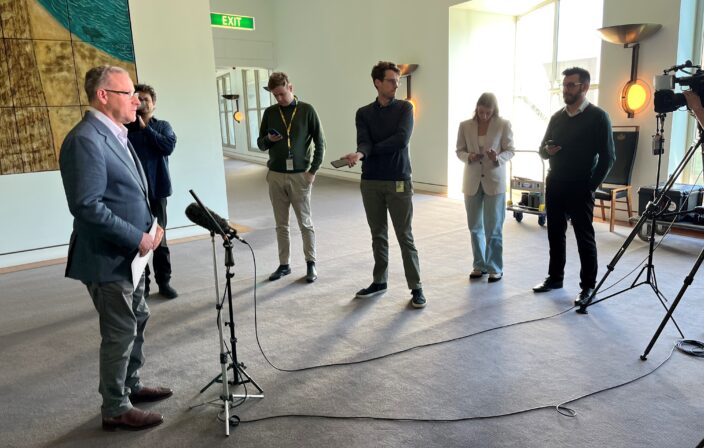Transcript: Doorstop ACCI on small business definition
14 Oct 2024
|Transcripts

Event: Andrew McKellar doorstop at Parliament House Canberra
Date: Monday 14 October 2024
Topics: Changing the legal definition of small business employers.
E&OE
Andrew McKellar:
Look, just wanted to make some comments around small business this morning. We want to shine a light on the difficulties that small business is encountering. Currently there are two main issues. Small business is grappling with ongoing higher costs to do business, and they’re also struggling with an increasing burden of red tape. We think that to reduce that impact of regulation, the best thing that should be done is to increase the definition of small business In the Fair Work Act from 15 to 25 employees, we think that would have a very significant impact in helping to reduce the level of compliance and red tape that small business has to deal with under current arrangements. Thank you.
Journalist:
Fundamentally, can you just fill us in, what would change by changing this definition from 15 to 25 from your perspective? What changes there?
Andrew McKellar:
Well, I think it makes a significant difference. At the moment, small business is really struggling with the new regulations that have come into place under the IR law changes, it applies to everything except currently multi-employer bargaining. So really it’s across the board. It’s having a broader impact. What we want to do is get to a situation where small business finds it easier to create jobs, to employ more people. At the moment, they face too many hurdles. The level of regulation has gone up significantly in the past 12 months in the past two years. Earlier this year, we surveyed small business, 82 per cent of small businesses said that they are struggling with the level of regulation compliance. At the moment, nearly half of all businesses, 45 per cent of small businesses, said that they had considered shutting their doors in the last 12 months. We want to change that dynamic. We want small business to be given a fair go, to be given an even break and to have a much better chance to thrive and grow in the Australian economy.
Journalist:
Now the minister has come out this morning being very definite that this is something that they’re not going to do and cited concerns around the unfair dismissal. What’s your response to that?
Andrew McKellar:
Well, I think it’s very puzzling because only in February this year when the last trench of legislation was passed, the minister at the time Tony Burke, agreed that they would have a review of the impact on small business. So it’s very strange that the current minister would be walking back from that commitment. That was an undertaking that was given to cross bench senators, in particular to Senator Pocock in order to get their support for that legislation to be passed. So if they’re walking back from that, if they’re saying that they’re not going to undertake that review, which they committed to, then I think that would be wrong. So we would urge the minister to go back, check the record, and ensure that they are undertaking a genuine review of the impact of the legislation on small business and to consider the definition of small business, not just in the Fair Work Act, but right across the board. That was their undertaking.
Journalist:
So do you think perhaps with a change of minister there’s now been a change of approach?
Andrew McKellar:
Well, I mean it’s the same government. So I mean we don’t just deal with ministers in isolation. This is a commitment that was given by the government to the cross bench when they were seeking their support to pass this legislation. So I think they’ve got to be consistent. They’ve got to honour their word. They said they would look at the impact on small business. We’re saying the time is right to do that and we urge them to honour their promise.
Journalist:
The ACTU’s Sally McManus, she’s also spoken this morning, seems that she’s in lockstep with the minister. Are you concerned here that the government is too aligned with the unions in this and not listening to small businesses?
Andrew McKellar:
Well, we are concerned and we do urge the government. Of course the government can talk to a range of different views around the economy. But the views of small business are absolutely critical. 98 per cent of all businesses are small businesses. Small business is doing it tough at the moment. They’re struggling with higher costs, they’re struggling with compliance and red tape. We think it’s important if you’re going to grow the economy, if you’re going to create jobs for the future, you’ve got to give small business a fair go.
Journalist:
Are you preparing to gear up? We’ve got an election coming, it’s looming. We don’t know when it is to fight on IR. Is this what you are planning to do to run a campaign and start lobbying on this to make it an election issue?
Andrew McKellar:
Well, I think what we we’re highlighting is that small business is important for the Australian economy and when you change the laws in industrial relations to make it harder for businesses to comply, to make it harder for businesses to make the decision to take on new employees to create jobs, then that is an issue that the major parties have to think about. We want the next government to give small business a better deal. We want to see the next government being fair to small business and of course we’re going to be highlighting those issues with the major parties in the run up to the election.
Journalist:
The Coalition today didn’t say either way, it was a bit confusing the response this morning. What do you make of where the Coalition’s at on this?
Andrew McKellar:
Well, look, I think the ball is in the court of the major parties. So small business is crying out that they are facing tough times at the moment. One of the things they’re struggling with most is complying with the red tape burden that they have. So I think whether it’s the Liberal party, whether it’s the Labor Party, we’re urging those parties to consider small business and to come forward with policies in the context of the next federal election, which gives small business a fair go.
Journalist:
Do you think the Albanese government is underestimating how the potential vote of backlash from businesses, not just small businesses, but medium to large as well? What’s the sentiment or perhaps tell us what the sentiment is like at the moment?
Andrew McKellar:
Well, I think what you’re hearing from the business community reflects some of the pressures that are out there, that individuals that households are facing, the cost of business has been going up. The opportunities to run a business have been getting more difficult. We’ve got to attract investment to Australia. We can’t take these things for granted. We really do have to put our best foot forward. Now small business is absolutely critical as part of that equation. If we don’t give small business a fair go, then I think the major parties will see the reflection of that at the ballot box whenever that may occur.
Journalist
Sorry, I was here late. Have you touched on the Pocock promise?
Andrew McKellar
I have Phil, so look, I think it’s a very important issue. I mean the government, the minister at the time gave a very clear undertaking in order to secure the support of cross benches for the legislation that they put forward earlier this year. They gave an undertaking that they would review the definition of small business, not just in the Fair Work Act, but across the board. So I think we take the minister back to that commitment. We urge them to honour the commitment that was given at that point in time and we would expect that they will be held to account if they don’t honour that commitment. Thanks. Very good.


